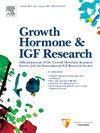Growth hormone regulates deiodinase type 2 and 3 expression via GATA
IF 1.6
4区 医学
Q4 CELL BIOLOGY
引用次数: 0
Abstract
Objective
Growth hormone (GH) is involved in bone and skeletal muscle growth directly or indirectly via STAT5 and/or insulin-like growth factor (IGF)-1. Thyroid hormone (TH) is essential for general cellular growth and metabolic regulation. While both GH and TH are essential for growth, their actions may partially complement each other in conditions of hormonal deficiency. For example, TH can enhance GH secretion and sensitivity, while GH is ineffective in Refetoff syndrome due to TH receptor dysfunction. However, the underlying molecular mechanism remains unclear. In this study, we investigated the molecular mechanisms underlying the complementarity between GH and TH, paying special attention to the effects of GH on the expression of both iodothyronine deiodinase (DIO) type 2 (DIO2) and type 3 (DIO3).
Design
The effects of growth hormone (GH) on DIOs were examined using reporter assays, chromatin immunoprecipitation, quantitative PCR, and western blotting using HEK293-derived TSA201 cells and mouse ATDC5 chondrocytes.
Results
GH induced the mRNA and protein expression of DIOs in ATDC5 cells via STAT5/GATA. GATAs activate the promoter activity of both DIOs. The binding sites for GATA on the DIO promoter were located −87 bp and − 75 bp upstream from the TSS for the DIO2 promoter and − 6 bp upstream from the TSS for the DIO3 promoter, respectively. GH-induced expression of DIOs in ATDC5 cells was abolished by K-7174, a GATA-specific inhibitor.
Conclusion
The present study demonstrates that GH regulates DIO2 and DIO3 expression via JAK/STAT5/GATAs after binding to GHR. This is the first report on the molecular mechanisms underlying GH-dependent compensation of TH action. (256 words).
生长激素通过GATA调控2型和3型脱碘酶的表达
目的:生长激素(GH)通过STAT5和/或胰岛素样生长因子(IGF)-1直接或间接参与骨和骨骼肌生长。甲状腺激素(TH)是一般细胞生长和代谢调节所必需的。虽然生长激素和促甲状腺激素都是生长所必需的,但在激素缺乏的情况下,它们的作用可能部分互补。例如,TH可以增强GH的分泌和敏感性,而GH由于TH受体功能障碍,对Refetoff综合征无效。然而,潜在的分子机制尚不清楚。在这项研究中,我们研究了GH和TH互补的分子机制,特别关注GH对碘甲状腺原氨酸脱碘酶(DIO) 2型(DIO2)和3型(DIO3)表达的影响。使用hek293衍生的TSA201细胞和小鼠ATDC5软骨细胞,采用报告基因法、染色质免疫沉淀法、定量PCR和western blotting检测生长激素(GH)对DIOs的影响。结果gh通过STAT5/GATA诱导ATDC5细胞中DIOs mRNA和蛋白的表达。GATAs激活两个DIOs的启动子活性。GATA在DIO启动子上的结合位点分别位于DIO2启动子的TSS上游- 87 bp和- 75 bp, DIO2启动子的TSS上游- 6 bp。gata特异性抑制剂K-7174可抑制gh诱导的ATDC5细胞中DIOs的表达。结论GH与GHR结合后,通过JAK/STAT5/GATAs调控DIO2和DIO3的表达。这是关于gh依赖的TH作用补偿的分子机制的第一份报告。(256字)。
本文章由计算机程序翻译,如有差异,请以英文原文为准。
求助全文
约1分钟内获得全文
求助全文
来源期刊

Growth Hormone & Igf Research
医学-内分泌学与代谢
CiteScore
3.30
自引率
0.00%
发文量
38
审稿时长
57 days
期刊介绍:
Growth Hormone & IGF Research is a forum for research on the regulation of growth and metabolism in humans, animals, tissues and cells. It publishes articles on all aspects of growth-promoting and growth-inhibiting hormones and factors, with particular emphasis on insulin-like growth factors (IGFs) and growth hormone. This reflects the increasing importance of growth hormone and IGFs in clinical medicine and in the treatment of diseases.
 求助内容:
求助内容: 应助结果提醒方式:
应助结果提醒方式:


